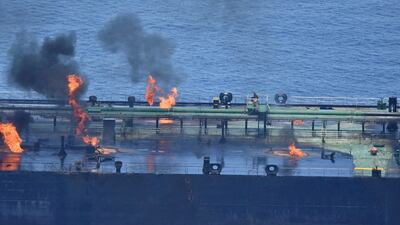Live updates: Follow the latest from Israel-Gaza
The Greek-flagged MV Sounion crude oil tanker, which was attacked by Yemen's Houthi rebels in the Red Sea last week, is still ablaze and appears to be leaking, the Pentagon said on Wednesday.
“Sounion now sits immobilised in the Red Sea, where it is currently on fire and appears to be leaking oil, presenting both a navigational hazard and an environmental catastrophe,” Maj Gen Patrick Ryder said in a news briefing.
Attempts at salvage were frustrated by the Iran-backed Houthis, who have threatened more attacks.
Gen Ryder said two tugs were sent by a third party to the burning vessel, but they were warned off by the Houthis.
US Central Command is monitoring the situation and co-ordinating with maritime partners on how best to assist the vessel, he said.
The Sounion, owned and operated by the Greek shipping company Delta Tankers, was carrying about one million barrels of crude oil from Iraq to Greece, and a spill could be one of the largest yet recorded. The crew were evacuated a day after the attack.
Julien Jreissati, programme director for Greenpeace Middle East and North Africa, told The National that the Red Sea is a natural treasure which needs to be protected and that the implication of a spill on the environment and the surrounding states are high.
Mr Jreissati said there needs to be “response equipment that is already in place and ready to be deployed if or when a massive spill happened, like containment booms, for example.”
Greenpeace, he said, has been unable to verify whether the tanker is spilling oil but can safely say from satellite images that the vessel is burning.
“What is happening in the Red Sea is both a result of the escalating tension in our region, and also a contributor to that too,” Mr Jreissati said.
European Union naval forces in the region said last week that there was no sign of a spill. However, the Pentagon's statement is the first official mention of a likely spill.
The ship was first hit by gunfire from two boats on August 21, then it was struck by three projectiles that started a fire and left it dead in the water, the UK Maritime Trade Operations office said. A European warship reached the 25 crew members a day later and took them to Djibouti.
The oil tanker was later attacked again. The Houthis posted a video purportedly showing them setting it on fire.
The EU's mission in the Red Sea, known as Aspides, is assessing protective measures including towing the tanker, according to Reuters.
The rebels have been attacking ships in the Red Sea for the past 10 months in solidarity with the Palestinians following Israel's war on the Gaza Strip that started last October.
Greenpeace has been calling for an immediate and comprehensive ceasefire in Gaza, Mr Jreissati said.
“Forty thousand deaths, mainly children and women, should be enough of a reason for a ceasefire to happen. It should not be motivated by the fact that global trade might be affected,” he said.
The Houthis claim they are attacking ships that are linked to Israel. At least two have been sunk and two crew members have been killed since the rebels started their attacks.
“What is in the hand of the global powers is a ceasefire in Gaza and this is where they can create a real change and find a solution, much more than any potential escalation and intervention in the Red Sea,” Mr Jreissasti added.
International shipping has been largely disrupted by the attacks and they have pushed thousands of ships to avoid the area. Crews are taking a longer route around the Cape of Good Hope and using trans-shipment ports such as Singapore.


